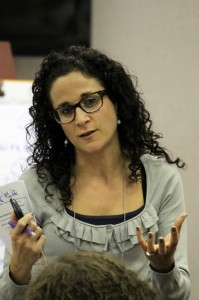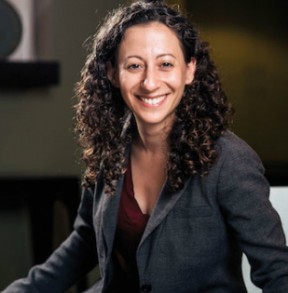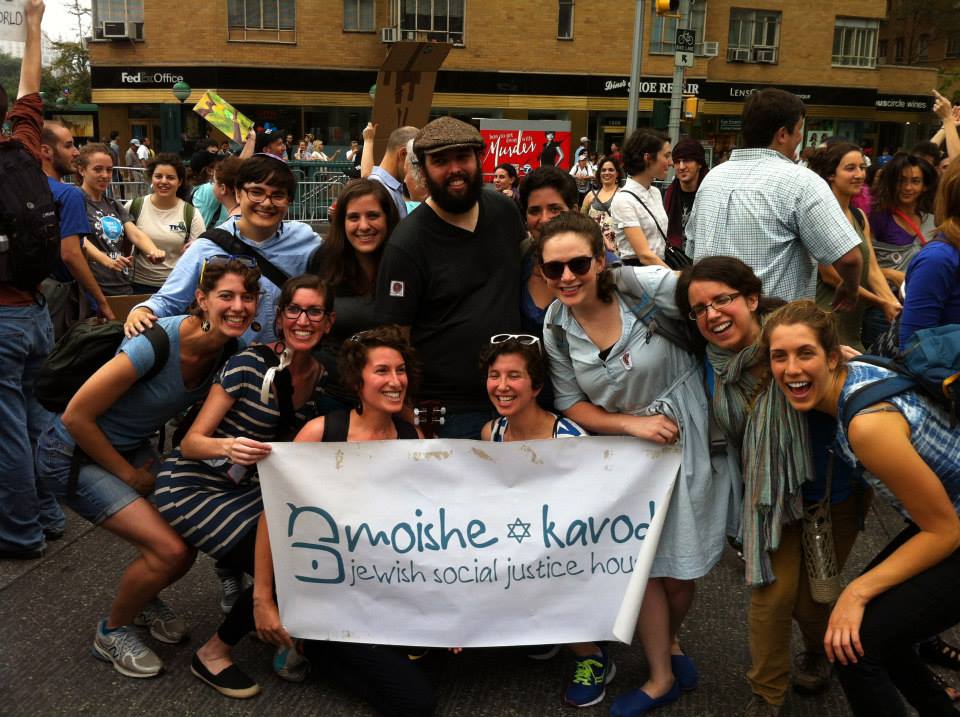 Rabbi Michelle Dardashti is a JOIN leader and an alum of our Seminary Leadership Program. Rabbi Dardashti serves as the Associate University Chaplain to the Jewish Community at Brown University and Rabbi at Brown RISD Hillel.
Rabbi Michelle Dardashti is a JOIN leader and an alum of our Seminary Leadership Program. Rabbi Dardashti serves as the Associate University Chaplain to the Jewish Community at Brown University and Rabbi at Brown RISD Hillel.
Her essay, “Checking Our Privilege,” an Obligation Bestowed by our Ancestors: Learning Intersectionality from Jacob” first appeared on Jewschool. Rabbi Dardashti challenges us to tie privilege to the weekly Torah portion:
Jacob has a thing for messing with the expected societal order. His story begins with striving to claim for himself what his birth-order denied and ends with his enforcing this switch upon his grandsons.
“When Joseph saw that his father [Jacob] was placing his right hand on Ephraim’s head, he thought it wrong; so he took hold of his father’s hand to move it from Ephraim’s head to Manasseh’s. ”Not so, Father,” Joseph said to his father, “for the other is the first-born; place your right hand on his head.” But his father objected….” (Gen. 48: 17-19).
One’s first instinct in reading is to simply presume that old habits die hard and Jacob has learned nothing from his own destructive experiences with meddlesome blessing bestowal and favoritism. But in reading Genesis this year, with dynamics of power and privilege at the forefront of my thinking, I’m inclined to believe there’s something deeper at play. A closer look at the stories of our ancestors reflects that the supposed precept of a birthright—privileging/entitling an eldest son to a greater share of blessing simply by virtue of being the first born—simply was not upheld. (Evidence: Isaac and Ishmael, Jacob and Esau, Joseph and his brothers – our narrative lists and preferences each in a manner contrary to their seniority.)
Consumed of late by conversations about institutional and structural discrimination, I can’t help seeing Jacob through this lens and taking pride in the way our foundational Torah tales consistently subvert the notion that accidents of birth should confer privilege. Privilege, in faith speak, is none other than blessing – something to which no one is entitled, but rather granted by grace, that’s why gratitude is the bedrock of our faith; Jews, in Hebrew, are “Yehudim,” meaning “thankful ones.” Privilege, says our tradition, should not be institutionalized and when afforded, should inspire both gratitude and a heightened sense of responsibility. Accordingly, “checking one’s privilege”—just like “counting one’s blessings”—is paramount and about the most Jewish thing one can do.
Understanding Jacob as modeling the above sheds new light on the famed scene of his wrestling with an angel. From this perspective, his all-night fight prior to reencountering Esau is about working through—“checking”—feelings of un-entitlement to privileges bestowed; the name Israel, which he receives after wrestling and emerging forever marked by a limp, comes to embody this stance of humble gratitude (privileges in check). It’s only in facing his guilty conscience over blessings he obtained at Esau’s expense that he’s able to properly and positively encounter his brother; the process Jacob undergoes of owning his privilege is what transforms him from adversary to true brother, what allows him to show up as a legitimate ally in Esau’s eyes.
A colleague from another student center at Brown University, where I serve as Rabbi and Associate Chaplain, recently put these dynamics in context as follows: While not all Jews see themselves as white, the reality is that most Jews in this country have white privilege and it’s only in fully owning this privilege that they will be accepted as allies by students of color.
As a community, we are enriched by the biracial Jewish students and also Jews of color in our midst, with and about whom we’re deepening conversation through our recently formed Jews of Mixed Identity Group, or J-MIG. The majority of our Jewish students, however, are indeed white-presenting and some among them bristle at the charge by my colleague; they reject the notion that they have privilege due to Jews’ historic position as an oppressed minority and the anti-Semitism that’s still alive and well in the world.
In light of this predicament—a desire by the Jewish community to be in meaningful and authentic solidarity with people of color (POC) at this time, coupled with discomfort by some students with perceived prerequisites—I, together with phenomenal student leaders of our J-MIG and Tzedek groups, designed an evening to allow (and in many senses, push) our community to do some internal wrestling of our own. Entitled “Talking Race and Racism, from Ferguson to Campus: A Hillel Conversation,” the description noted its intention to explore “To what extents (if at all) do we, as Jews, see ourselves as white, privileged, powerful, oppressed, and/or able/obligated to be in solidarity/allyship with POC in the wake of the verdicts on the Mike Brown and Eric Garner cases and climate of racial injustice and inequality in this country?” In opening, we brought a text by Gina Crosley-Corcoran, explaining privilege by defining intersectionality. She writes, “The concept of Intersectionality recognizes that people can be privileged in some ways and definitely not privileged in others. There are many different types of privilege, not just skin color privilege, that impact the way people can move through the world or are discriminated against.”
Here again, Jacob’s story is instructive. “Few and bad have been the days of my life,” attests Jacob when brought before Pharaoh in last week’s parasha (Genesis 47:9). Why, if he appreciated his privilege and blessings, does Jacob give such a report? The explanation lies in understanding intersectionality. Jacob’s having been graced by God’s blessings in so many respects, negates neither the adversity he faced nor the reality that in his present context he is decidedly subservient and “other” – a starving Hebrew seeking refuge in a foreign land. While in encountering Esau, with whom he wished to build allyship, it was vital that he own his unearned blessings and privilege, in addressing Pharaoh, who had far greater power than he and from whom he wished to gain shelter and sustenance for his family, it made sense to highlight his struggles. Jacob’s story reflects the appropriateness of owning and checking our privilege in different ways at different times.
In the context of America today we need not behave as subjects encountering Pharaoh. Though the Jewish community is not a monolith in terms of whiteness and socio-economic status, we are not marginalized strangers here; by and large, we have power and privilege and must use it effectively to undermine racial preferences and prejudices at play. Our experience as strangers in Egypt was intended not to scar but strengthen us and insure that we would protect and uplift strangers in our own midst whenever we were in a position to do so. Now is our time.
“Where are the Jews today?” asked my colleague, noting that anyone who knows anything about the fight for civil rights in this country fifty years ago knows that Jews were at the forefront of that movement in ways they are not today. My colleague clearly attributes our diminished presence in the trenches to our community’s generally increased privilege having made us more bourgeois and conservative and less empathetic and concerned with the plight of the marginalized. While I know that to be an oversimplification—overlooking some formidable fissures and challenges in relations between African Americans and Jews over the last half century, which call for conversations and much wrestling within and between our communities to unpack exactly “where we’ve gone”—I agree that a necessary first step in getting us back to the frontlines of seeking racial and economic justice in this country is checking our privilege. There are many Jewish leaders, communities (including institutions of traditional Jewish learning, such as Hadar, Drisha and Yeshiva University) and social-justice organizations (T’ruah, Jews United For Justice, Bend the Arc and Jews For Racial and Economic Justice, to name a few) raising their voices and praying with their feet, particularly in the wake of Ferguson. These conversations and actions must continue to expand; this is ultimately the legacy Jacob bequeaths.
Before leaving the scene, in blessing his grandsons in this week’s parasha, Jacob shifts not only his hands, but the way he tells his story. He invokes not the “badness” of his life, as he did with Pharaoh, but rather the miraculous way in which an angel accompanied him, redeeming him “from all the badness.” Jacob closes the book of Genesis and story of his life recalling his blessings and owning his privilege as he did in the scene with the angel. This is the legacy which prepares us for the next book of the Bible, in which we formally become a nation through the experience of slavery and redemption. Gratitude—a checking of our privilege and counting of our blessings—is at the core of our identity as Jews (Yehudim, “thankful ones”) and as the Nation/People of Israel (Yirsrael, “wrestlers” with/for our blessings, emerging with privileges checked). Our thanks is meant to find expression in the mitzvot, ethical and ritual commandments. It’s supposed to work like this: blessing/privilege begets gratitude and gratitude begets responsibility and obligation. The Exodus pointedly underlines and institutionalizes this lesson: we are redeemed in order to redeem others; we experience the blessing, the privilege, of liberation so that we always seek that liberation for others.
Hazak hazak v’nithazek – “strength strength and we shall be strengthened.” This is the prayer we proclaim in completing one book of the Torah and starting the next and it’s also one I carry for our community in its engagement with justice and building of solidarity in our country today. Onward.
Read Rabbi Dardashti’s article on the Jewschool website.
May we all walk into strength in this new year!
 This week on RJ.org, guest blogger Steven Windmueller wrote a great piece about JOIN Board member Rabbi Stephanie Kolin: about her new position at New York’s Central Synagogue and about her role in modern-day religious leadership. He writes:
This week on RJ.org, guest blogger Steven Windmueller wrote a great piece about JOIN Board member Rabbi Stephanie Kolin: about her new position at New York’s Central Synagogue and about her role in modern-day religious leadership. He writes:



 Rabbi Michelle Dardashti is a JOIN leader and an alum of our Seminary Leadership Program. Rabbi Dardashti serves as the Associate University Chaplain to the Jewish Community at Brown University and Rabbi at Brown RISD Hillel.
Rabbi Michelle Dardashti is a JOIN leader and an alum of our Seminary Leadership Program. Rabbi Dardashti serves as the Associate University Chaplain to the Jewish Community at Brown University and Rabbi at Brown RISD Hillel.



